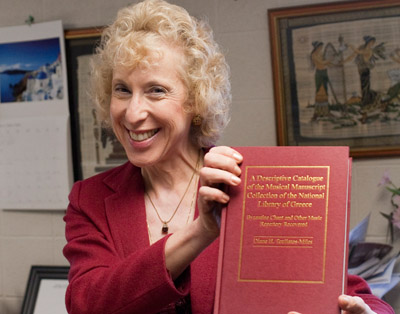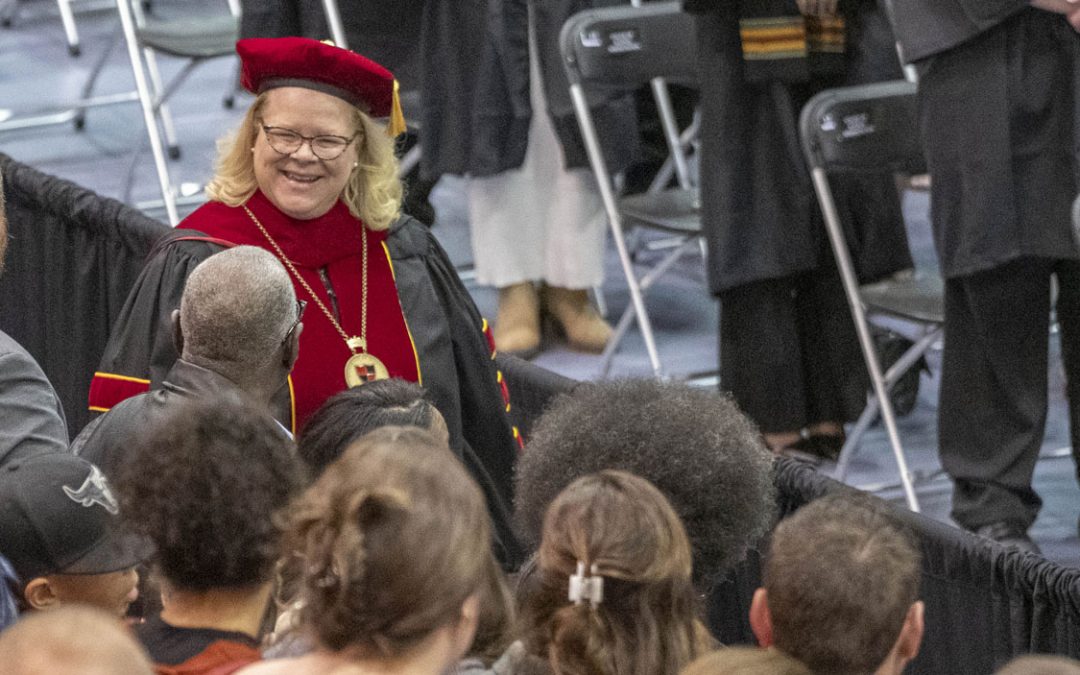
Diane Touliatos-Miles, Curators' Professor of Music at UMSL, wrote "A Descriptive Catalogue of the Musical Manuscript Collection of the National Library of Greece."
Over 12 summers, musicologist Diane Touliatos-Miles mined the National Library of Greece in Athens, one of the world’s richest depositories of Byzantine musical manuscripts. She unearthed 241 centuries-old Western, Ancient Greek and Byzantine music manuscripts. The information amassed by Touliatos-Miles, Curators’ Professor of Music at the University of Missouri–St. Louis, is now captured for the first time in book form.
“A Descriptive Catalogue of the Musical Manuscript Collection of the National Library of Greece: Byzantine Chant and Other Music Repertory Recovered” was created by her to recover or, in some instances, present for the first time the repertory of musical sources of the library.
Hours were spent in the library, a building that Touliatos-Miles described as having the feel of the Parthenon, only enclosed.
“It has the Greek columns in front and marble floors – just a beautiful structure,” she said.
Most of her time was spent in the music manuscript archives – in the library’s attic. With the building’s limited wiring, there was no air conditioning. So the library staff kept the attic lights off due to the heat they would generate.
With a flashlight and special permit in hand, as well as the library director’s blessing, she took to the attic to pore over ancient documents. They were about the thickness of a paper grocery bag and typically on the brink of disintegration. And the handwritten print was often fading on many of the manuscripts or simply difficult to read due to poor handwriting.
“To decipher these things, it takes a careful eye and sometimes a really good magnifying glass,” she said.
There was also the matter of the varying dialects from one manuscript to another.
“It was like using Chaucer’s English and then moving onto Shelley’s English,” she said.
Despite the years of work Touliatos-Miles poured into creating the book, it wasn’t exactly a dream project.
“It was born out of frustrations,” she said.
Touliatos-Miles had regularly conducted research at the library since her first visit as a Fulbright in 1976. Just finding the musical documents, which were not catalogued, was time-consuming. It would eat into research time that was invaluable due to the library’s limited hours: 8 a.m. to 2 p.m.
“I’d strike out as many times as I would find music,” Touliatos-Miles said. “And you’re working against the clock because when they shut down for the day, that’s it. You have to wait to continue your work until another morning.”
But she had few alternatives. The National Library of Greece is second in the nation only to the monasteries of Mount Athos in terms of its holdings of Byzantine musical manuscripts. But women aren’t allowed in the monasteries. For Touliatos-Miles, a musicologist specializing in Medieval Byzantine music, the library was her primary source for research.
She wasn’t alone in her frustrations. Musicology colleagues from around the globe came to the library to research ancient music and ran into the same roadblocks.
With Touliatos-Miles’ frequent visits to the library, she began to attain a vast knowledge of the library’s holdings and where to find them. Soon, she was receiving encouragement by colleagues to put her knowledge down on paper for others to use. Knowing the depth of the project, she was reluctant to take it on. But she did.
The resulting book includes a meticulous listing of the library’s musical contents in their original language, titles of compositions, composers, modal signatures, other attributions, information on performance practice and a glossary that defines terms for non-specialists. Each entry also features a commentary in English indicating highlights and the composition’s significance.
The book was published in October by Ashgate and is already part of several noteworthy collections, including the Library of Congress in Washington, D.C.; Harvard University’s Dumbarton Oaks Research Library and Collection in Washington, D.C.; and Oxford University’s Bodleian Library in Oxford, England. It’s also garnered a favorable reception by several international musicologists.
“Professor Touliatos-Miles’ descriptive catalogue of the musical collections of the Athens National Library fills a major gap in the field of Byzantine musical studies,” Alenxander Lingas, lecturer in music at City University in London, wrote in a review. “The national library’s collection of musical manuscripts is one of the most important in existence, and the absence of a proper guide to it has frustrated researchers who have become accustomed to the availability of such works describing the manuscripts in other major archives.”
In addition to “Descriptive Catalogue of the Musical Manuscripts of the National Library of Greece,” Touliatos-Miles is the co-editor of “Women in the Arts: Eccentric Essays in Music, Visual Arts and Literature,” which was also published this year. She has several other books in the works including “HER ART: Greek Women in the Arts from Antiquity to Modernity” and “Kassia and Her Musical Contributions,” which will focus on the earliest woman composer.
More information:
http://www.umsl.edu/~umslmusic/bios/touliatos.html
http://bit.ly/dWMZAc














